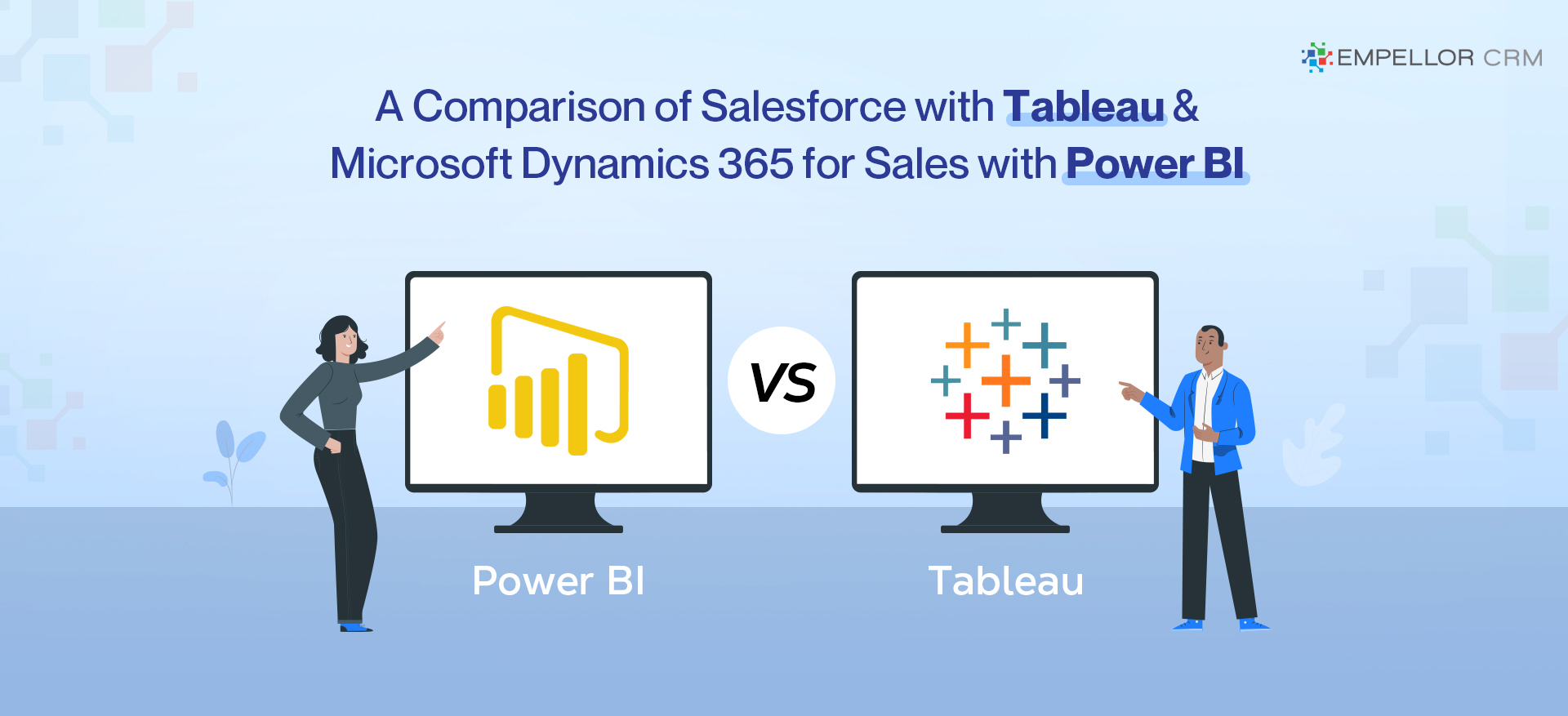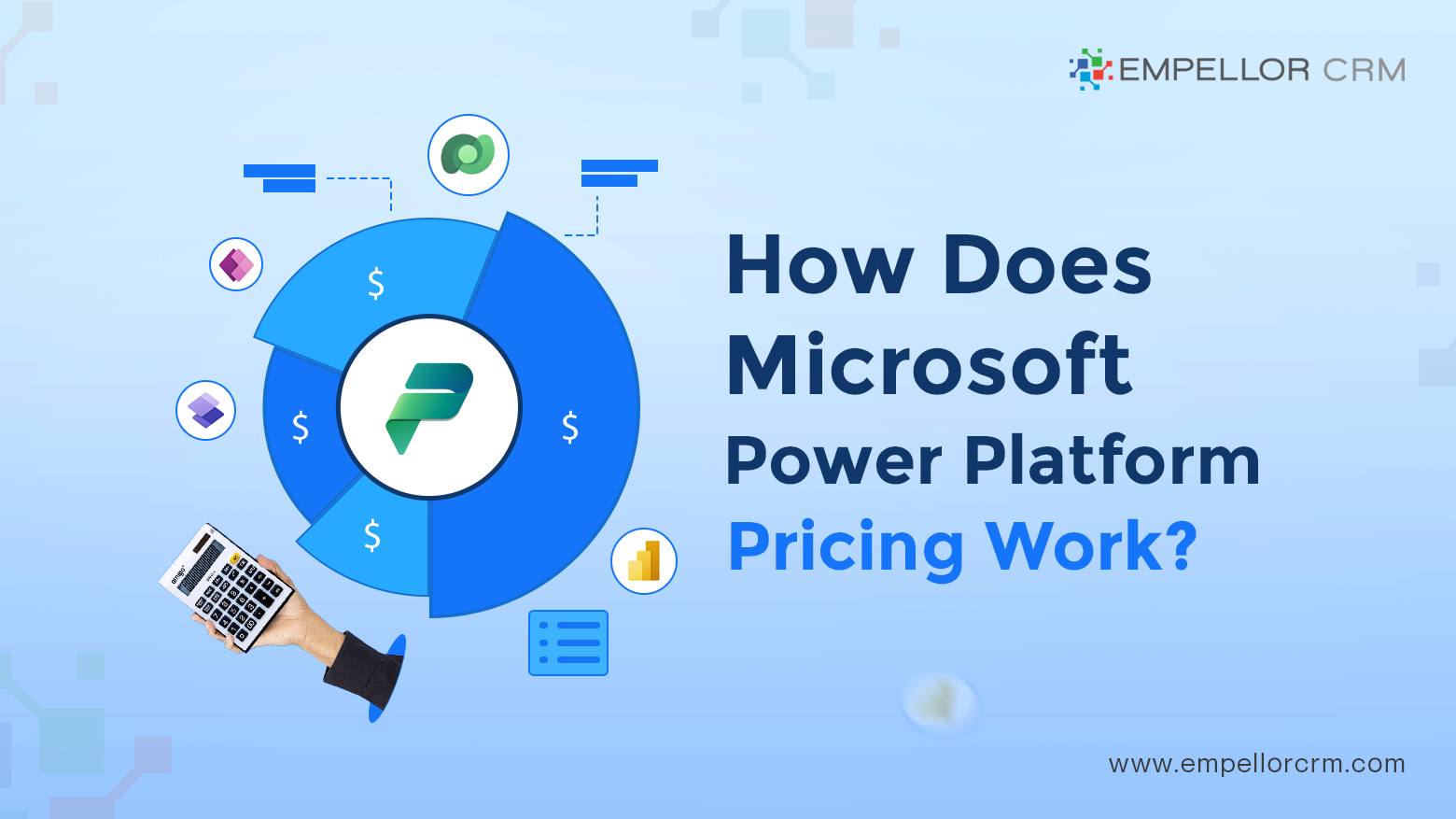Claim your free copy of the book CRM Shouldn’t Suck
Claim your free copy of the book CRM Shouldn’t Suck
Tableau vs. Power BI: A Comparison of Salesforce with Tableau and Microsoft Dynamics 365 for Sales with Power BI

In the realm of data analytics and business intelligence (BI), two giants stand out: Tableau and Power BI. As businesses strive to harness the power of their data, choosing the right tool is crucial. In this post, we will compare Tableau and Power BI by examining their integration with two leading customer relationship management (CRM) platforms: Salesforce and Microsoft Dynamics 365 for Sales. By the end, you’ll have a clearer understanding of how these tools can enhance your business operations. So, let’s dive into the Tableau vs. Power BI showdown!
Introduction to Tableau and Power BI
Before we delve into the comparison, it’s essential to understand what Tableau and Power BI are. Tableau is a powerful data visualization tool known for its ability to transform raw data into easily understandable dashboards and reports. It excels in handling large datasets and offers extensive customization options. On the other hand, Power BI, a product of Microsoft, is renowned for its integration capabilities with other Microsoft products. It offers robust data analysis features and is particularly strong in its ease of use and accessibility.
Salesforce with Tableau: A Powerful Combination
Salesforce, a leading CRM platform, is widely used for managing customer relationships and sales processes. When integrated with Tableau, it offers a robust solution for data visualization and analytics. Tableau’s ability to handle large volumes of data makes it an excellent choice for Salesforce users who need in-depth insights into their sales and customer data.
Advantages of Using Tableau with Salesforce
- Advanced Data Visualization: Tableau’s strength lies in its advanced data visualization capabilities. It allows users to create interactive and visually appealing dashboards that can uncover hidden patterns and trends in Salesforce data.
- Flexibility and Customization: Tableau offers extensive customization options, enabling users to tailor dashboards and reports to meet their specific needs. This flexibility is crucial for businesses with unique data requirements.
- Handling Large Datasets: Salesforce often generates vast amounts of data. Tableau’s ability to handle large datasets ensures that users can analyze and visualize their data without performance issues.
- Real-Time Data Integration: Tableau’s real-time data integration with Salesforce ensures that users have access to the most up-to-date information, allowing for timely and informed decision-making.
Use Cases for Tableau with Salesforce
- Sales Performance Analysis: Businesses can use Tableau to create detailed sales performance dashboards, providing insights into sales trends, pipeline status, and revenue forecasts.
- Customer Segmentation: Tableau’s visualization capabilities allow businesses to segment their customers based on various criteria, such as purchase history, demographics, and engagement levels.
- Marketing Analytics: With Tableau, marketing teams can analyze campaign performance, track lead generation, and measure ROI, all within the context of their Salesforce data.
Microsoft Dynamics 365 for Sales with Power BI: Seamless Integration
Microsoft Dynamics 365 for Sales is another leading CRM platform, offering comprehensive sales management features. When paired with Power BI, it provides a seamless solution for data analysis and reporting. Power BI’s integration with other Microsoft products, such as Excel and Azure, enhances its appeal for businesses already using the Microsoft ecosystem.
Advantages of Using Power BI with Dynamics 365 for Sales
- Ease of Use: Power BI is known for its user-friendly interface, making it accessible to users with varying levels of technical expertise. Its drag-and-drop functionality simplifies the creation of reports and dashboards.
- Seamless Integration: Power BI integrates seamlessly with Microsoft Dynamics 365 for Sales, allowing users to pull data directly from their CRM system without the need for complex data extraction processes.
- Cost-Effective: Power BI offers a cost-effective solution for businesses, particularly those already using Microsoft products. Its pricing model is competitive, making it an attractive option for small to medium-sized enterprises.
- Collaboration and Sharing: Power BI’s integration with Microsoft Teams and SharePoint facilitates collaboration and sharing of reports and dashboards, enhancing team productivity.
Use Cases for Power BI with Dynamics 365 for Sales
- Sales Performance Monitoring: Power BI enables businesses to monitor sales performance in real-time, providing insights into sales targets, quotas, and individual sales rep performance.
- Customer Insights: With Power BI, businesses can gain deeper insights into customer behavior and preferences, helping to tailor sales strategies and improve customer satisfaction.
Financial Reporting: Power BI’s integration with Excel allows for comprehensive financial reporting, enabling businesses to track revenue, expenses, and profitability.
Tableau vs. Power BI: Key Differences
Now that we have explored the benefits of using Tableau with Salesforce and Power BI with Dynamics 365 for Sales, let’s highlight the key differences between Tableau and Power BI.
Data Visualization Capabilities
- Tableau: Tableau is renowned for its advanced data visualization capabilities. It offers a wide range of visualization options and allows for highly customized and interactive dashboards.
- Power BI: While Power BI also offers strong visualization capabilities, it is generally considered less customizable than Tableau. However, its integration with other Microsoft tools can compensate for this limitation.
Integration and Compatibility
- Tableau: Tableau integrates well with various data sources, including Salesforce. However, it may require additional connectors or middleware for seamless integration.
- Power BI: Power BI’s integration with Microsoft products is seamless, making it a natural choice for businesses using the Microsoft ecosystem. Its compatibility with Dynamics 365 for Sales is particularly strong.
Cost and Accessibility
- Tableau: Tableau’s pricing can be higher, especially for larger organizations with extensive data needs. Its licensing model is based on a per-user basis.
- Power BI: Power BI offers a more cost-effective solution, with flexible pricing options that cater to businesses of all sizes. Its accessibility and ease of use make it a popular choice for smaller businesses.
Performance and Scalability
- Tableau: Tableau is known for its performance and ability to handle large datasets efficiently. It is well-suited for organizations with significant data analysis needs.
Power BI: Power BI also performs well with large datasets, but its performance may vary depending on the complexity of the data models and reports.
Conclusion
In the Tableau vs. Power BI debate, the choice ultimately depends on your business needs and existing technology stack. Tableau excels in advanced data visualization and customization, making it a powerful tool for Salesforce users seeking in-depth insights. On the other hand, Power BI offers seamless integration with Microsoft products, ease of use, and cost-effective solutions, making it a natural fit for businesses using Dynamics 365 for Sales.
Both tools have their strengths and can significantly enhance your data analysis and decision-making processes. Whether you choose Tableau or Power BI, integrating them with your CRM system will undoubtedly provide valuable insights and drive business growth.


